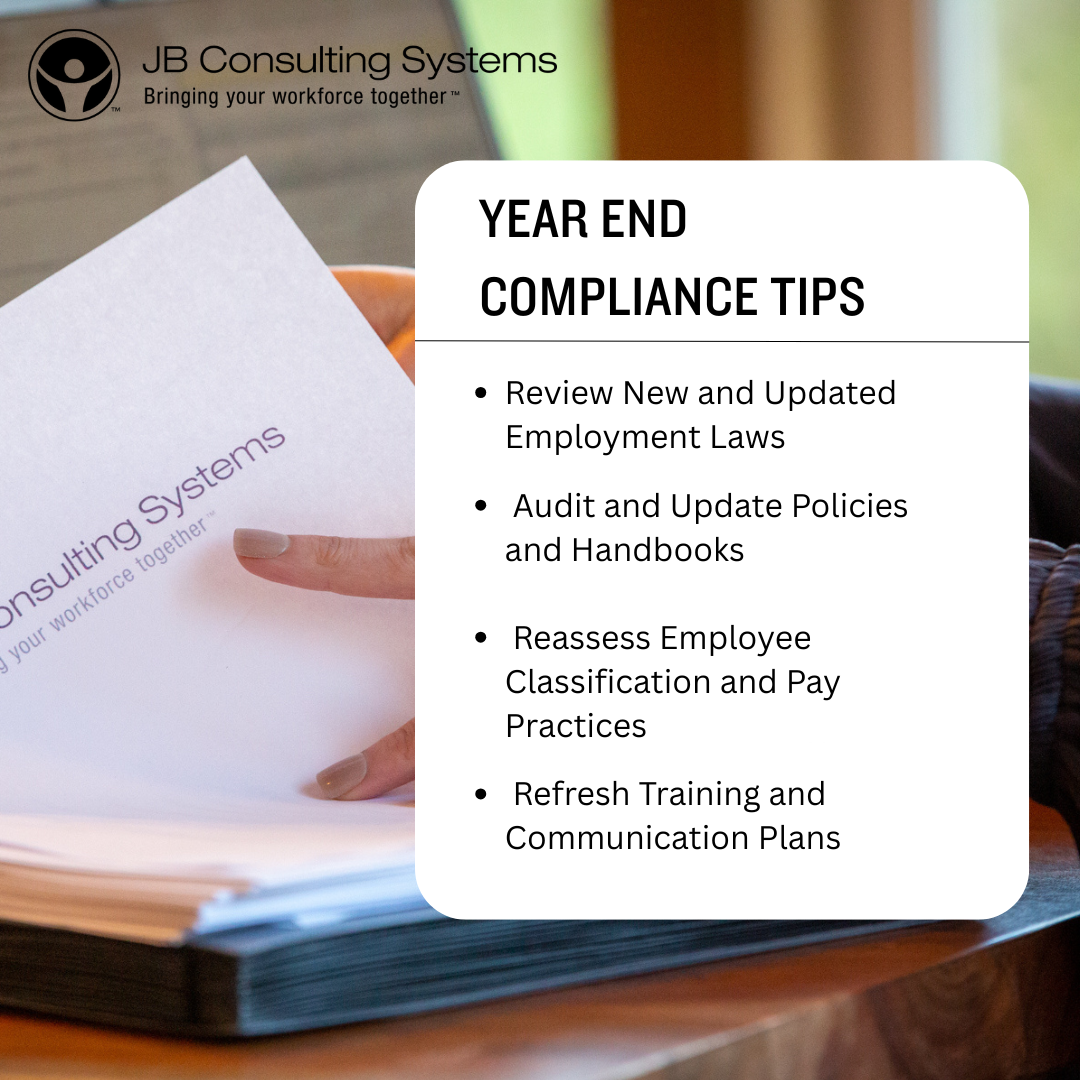As the calendar turns, HR professionals and business owners alike face the same challenge: keeping pace with evolving employment laws and compliance requirements. Whether you manage a growing business or oversee multiple states, the start of the year is the perfect time to step back, review what’s changing, and ensure your policies and processes stay ahead of the curve.
At JB Consulting Systems, we know that HR compliance isn’t just about avoiding penalties—it’s about building trust, protecting your people, and creating operational stability.
Review New and Updated Employment Laws:
Every January brings a wave of new or amended labor laws—minimum wage increases, paid leave expansions, pay transparency updates, and independent contractor rule changes, to name a few. Employers should identify which laws apply based on company size, industry, and location, and update handbooks, job postings, and payroll systems accordingly.
Even if your business operates in a single state, review your local city and county ordinances. Compliance requirements can differ by jurisdiction, and missing one update could lead to unintentional violations.
Audit and Update Policies and Handbooks:
A new year is the best time to revisit your employee handbook and make sure it reflects current legal standards and company practices.
Ask yourself:
- Do your leave policies align with new state or federal requirements?
- Are wage and hour policies still accurate?
- Have you incorporated current safety and remote work policies?
Having up-to-date documentation sets clear expectations for employees and demonstrates your commitment to compliance.
Reassess Employee Classification and Pay Practices:
It’s easy for job roles to evolve over time. Conduct an annual classification audit to ensure employees are correctly categorized as exempt or non-exempt under the Fair Labor Standards Act (FLSA). Also review compensation levels to confirm they meet or exceed any new salary thresholds.
This is also a good time to check that independent contractors truly meet the criteria under federal and state law—this area continues to receive heightened scrutiny from regulators.
Refresh Training and Communication Plans
Compliance isn’t only about documentation—it’s about consistent communication. Review required training, such as harassment prevention, workplace safety, and manager compliance courses, to ensure they’re current and scheduled for the year ahead.
Providing regular, proactive training helps protect your business while empowering employees to recognize and report issues early.
Evaluate Benefits and Leave Administration
Many benefit plan updates and contribution limits take effect at the start of the year. Coordinate with your brokers and payroll providers to confirm that plan documents, deductions, and eligibility rules align with federal and carrier requirements.
At the same time, review your leave tracking process. Whether you’re managing FMLA, state paid family leave, or your own internal programs, clear procedures ensure consistency and compliance.
Document Everything
Finally, make documentation part of your compliance culture. Keep written records of policy updates, training attendance, and employee acknowledgments. Should a question or audit arise later, thorough records demonstrate your diligence and good faith.
Final Thoughts
Navigating HR compliance updates doesn’t have to be overwhelming. With a structured year-end review and proactive planning, you can start the year confident that your policies, pay practices, and processes meet current requirements
If you need guidance updating your handbook, auditing compliance practices, or training managers on new laws, JB Consulting Systems can help you start the year on solid footing.

